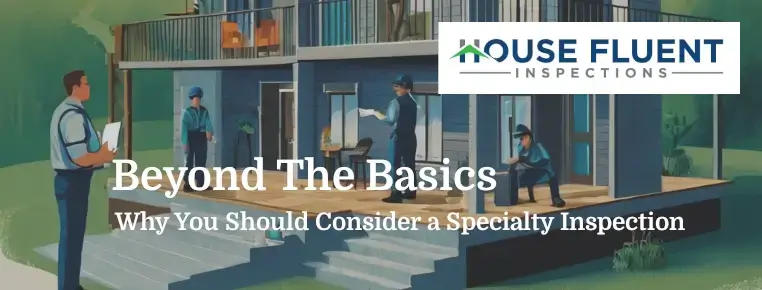What are specialty inspections? These are more focused evaluations that dive deeper into specific elements of the home, such as:
Common Specialty Inspections
- Sewer line and plumbing inspections using video cameras
- Swimming pool and spa inspections
- Wood-destroying insect/termite inspections
- Chimney and fireplace inspections
- Well and septic system inspections
- Water Testing
- Mold testing
- Radon testing
- Asbestos testing
- Lead-based paint testing
- Foundation inspections
While a general home inspector may take a cursory look at some of these items, a specialty inspector has more advanced training, certifications, and equipment to perform an in-depth analysis. For example, a general inspector may note that the sewer cleanout is present, but a plumbing specialist will actually run a camera through the sewer line to check for cracks, leaks, tree root intrusion, and other defects not visible from the outside.
When deciding whether to invest in a specialty inspection, consider the age, condition, and unique features of the home you are buying. An older home is more likely to benefit from sewer line, chimney, and wood-destroying insect inspections. A home with a pool or spa should definitely get a pool inspection. If the property has a well and septic system rather than municipal water and sewer, those should be thoroughly evaluated by a well and septic inspector.
Even if you are buying new construction, some specialty inspections may still be worthwhile. Sewer line inspections are recommended on any home, as sewer line problems are not always apparent right away. If the soil around the home is known to have high levels of radon or if the area was previously used for industrial purposes, radon and asbestos testing provide added reassurance.
The general home inspector can often give guidance on which specialty inspections are most important for a particular property. However, it’s up to you to choose which of these additional inspections to get based on your specific concerns, risk tolerance, and budget.
Keep in mind that specialty inspections are not always performed by home inspectors. Depending on the item or system, you may need to hire a licensed plumber, electrician, structural engineer, or other specialist. Your real estate agent can usually provide referrals to qualified professionals.
Specialty inspections do add some cost to the home buying process, but they are almost always money well spent. The findings can give you leverage to ask for repairs or concessions from the seller. Or, they may make you aware of safety hazards or looming expensive repairs that change your mind about the purchase altogether. At the very least, they help you enter into home ownership with eyes wide open about the true condition of the property.
Conclusion
In conclusion, getting specialty inspections that go beyond the scope of a general home inspection is a smart way to do your due diligence as a home buyer. To protect your investment, work with your real estate agent and inspector to determine which specialty inspections are recommended for your unique situation. A little extra effort and expense upfront can save you from unwelcome surprises down the road.


